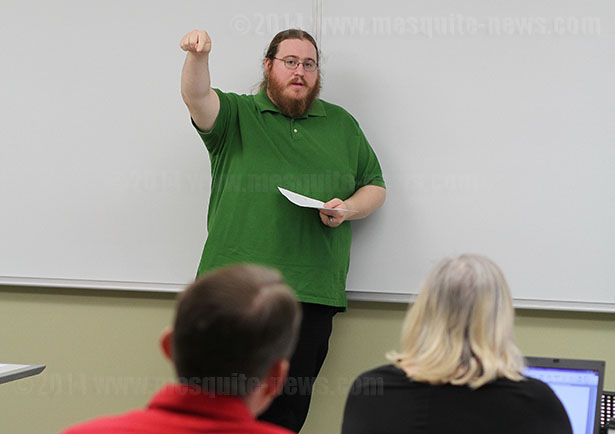
By Gladys Nunez
A letter opposing curriculum core change that eliminates an additional humanities course at the Alamo Colleges was presented during the March 7 Faculty Senate meeting.
The core change calls for the additional 3-hour humanities course to replace a 3-hour student development course. EDUC 1300, Learning Framework, teaches skills from “The 7 Habits of Highly Effective People” by Stephen Covey.
EDUC 1300 is a mandatory course in the social and behavioral sciences section of the college core for all arts and sciences and applied science degree plans for the 2014-15 core curriculum at the Alamo Colleges. It has received a negative response from all major faculty groups within the five colleges.
Vice President Edward Westermann opposes EDUC 1300 taking the place of a humanities course and thinks it should be an elective or student orientation course.
Sociology Professor Joe Simpson approached the Senate regarding taking a stand on the change, and proposed sending a letter he drafted addressed to the Alamo Colleges administration.
“They don’t understand. It’s an underestimation of the role humanities offers in helping people understand their lives,” Westermann said. “For example, great engineers built gas chambers at Auschwitz or an atomic bomb and did not have the ethical, moral or philosophical understanding of what those things are going to accomplish. But you can design it all day because you’re a great engineer.”
He said while the issue is worth the effort to bring concerns to the university and Alamo Colleges administration, “I don’t think it’s going to change.”
“In the college of education, students seeking EC-6 teacher certifications, 20 percent of their certification exam will come from their knowledge of art, music and movement. We (A&M-SA) do not offer any courses at this point,” said Melissa Jozwiak, early childhood education assistant professor.
“So the fact that they are further losing out of the prerequisites that they are being held accountable for the end, that is very disturbing,” Jozwiak said.
After discussion, the Senate formed an ad hoc committee, which includes members representing the university’s three colleges to respond to the issue.
The committee will propose a response to the issue by sending a letter, or possibly hold a public forum. Faculty Senate will vote on the proposed response in April.
New committees formed
Faculty Senate formed two committees based on a memo Provost Brent Snow sent, including a priority list, prior to the February meeting.
First, Snow wants to pull together a committee with Faculty Senate representation “to recognize faculty teaching in the same way the president’s circle recognizes faculty research,” President Brian Brantley said. One or two volunteers would serve on the committee.
“He’s very interested in providing some recognition and or reward for teaching,” Brantley said.
Second, Snow seeks a solution involving Student Rating of Instruction (SRI). He wants to know if all colleges are concerned on whether paper or electronic SRIs produce greater results.
During the meeting, a motion passed unanimously that the Senate will wait for results of a survey concerning faculty views on SRIs before providing a recommendation.
Secretary Vicky Elias, one person in charge of the survey, said it will poll all faculty, including adjuncts, in all three colleges.
Third, Snow asked for Senate representation to create a dean’s or provost’s list. Faculty Senate developed a general university committee consisting of one or two volunteers.
Faculty Senate elections
In other matters, Faculty Senate will conduct elections in April. The elections committee will meet before next month to decide how elections will take place and report at the April meeting.
“Each college has four senators and half of those terms expire in May,” Brantley said.
The Faculty Senate will meet 1 p.m. April 11 at an undetermined room in Brooks-City Base Campus.






